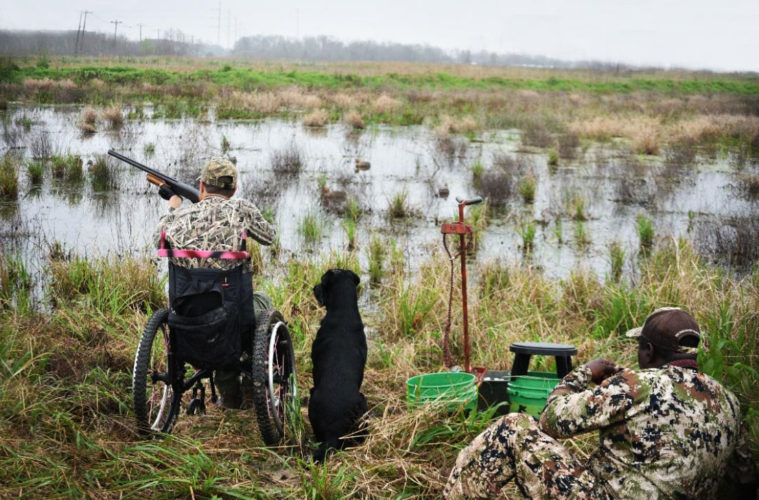 CURE NATION: Cure Advocate Chad Waligura is what’s known as a super quad, because he still has use of his strong triceps and arms although he has limited hand function. An avid outdoor sportsman, Chad has improvised new ways to pursue his love of hunting and fishing regardless of hand function, so it only makes sense that he would create a super role for his service dog, Vegas, to help her assist him in the outdoor fun.
CURE NATION: Cure Advocate Chad Waligura is what’s known as a super quad, because he still has use of his strong triceps and arms although he has limited hand function. An avid outdoor sportsman, Chad has improvised new ways to pursue his love of hunting and fishing regardless of hand function, so it only makes sense that he would create a super role for his service dog, Vegas, to help her assist him in the outdoor fun.
Below, Chad shares his journey of training Vegas as a hunting retriever so his best furry friend could lend a useful paw on their adventures in the field.
The journey began, oddly enough, in Las Vegas back in July of 2015. Sitting at a poker table at the Mirage resort, I got the text I’d been waiting on for two months. Back in Texas in the small town of Winnie, seven tiny Labrador puppies had been born, and if I wanted one, I’d have the first pick. It’d cost me a $500 deposit if I did.
As luck would have it, I left the poker table that day with more than $500, enough for a new pup and a collar or two. I couldn’t wait to get home and go see ‘em.
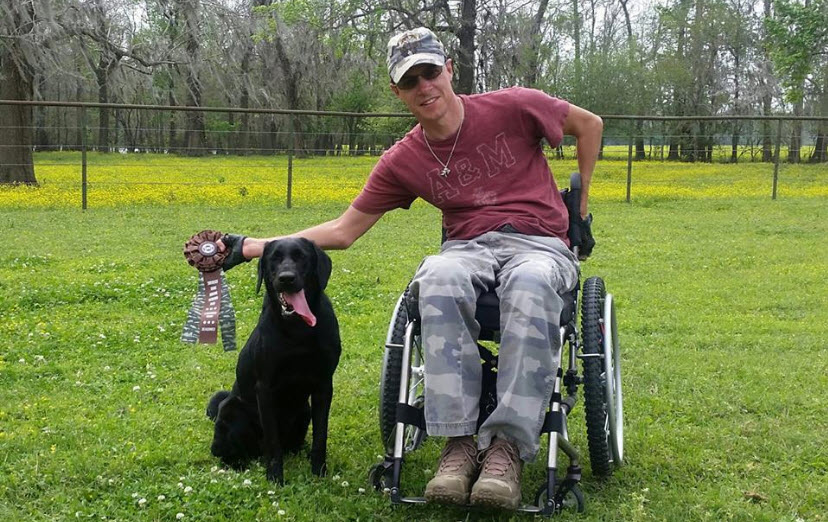
Chad knew Vegas was a winner the minute he met her as a puppy.
Getting into bird hunting at a young age, the idea of one day having a gun dog, a real gun dog, seemed like something for the future. It wasn’t until after my injury that I thought about getting one professionally trained – one that will stick by me in the field, be steady, obey my whistle commands and hand signals, and the most important thing to me as a wheelchair hunter… deliver to hand.
When you’re young, you don’t realize what goes into training a dog like that but after trying to train a few on my own, I knew I was going to need professional help.
PICKING OUT A PUPPY IS THE FIRST STEP TO HAVING A FINISHED GUN/SERVICE DOG
Six weeks after my Vegas trip, I was in Winnie, Texas picking out a new addition to the family. She was an eight pound black-haired bundle of joy officially named Texas Best High Roller with a call name of “Vegas.”
In the weeks leading up to that day, I’d followed up on some trainer recommendations from a friend that’d been on the hunt test circuit, and after trimming his list to three, I drove to meet each one to review their operations. I chose Vince Cannon who lived an hour away from me in Brazoria, TX.
Vince is a self-taught gun dog trainer whose kennel only holds ten dogs at a time. This meant he’d be the one training Vegas and I could reach him anytime by phone. I told Vince I wanted a gun dog first and if she could do more, then we’d try the hunt tests. I never dreamed as a quadriplegic, I’d be her handler one day.
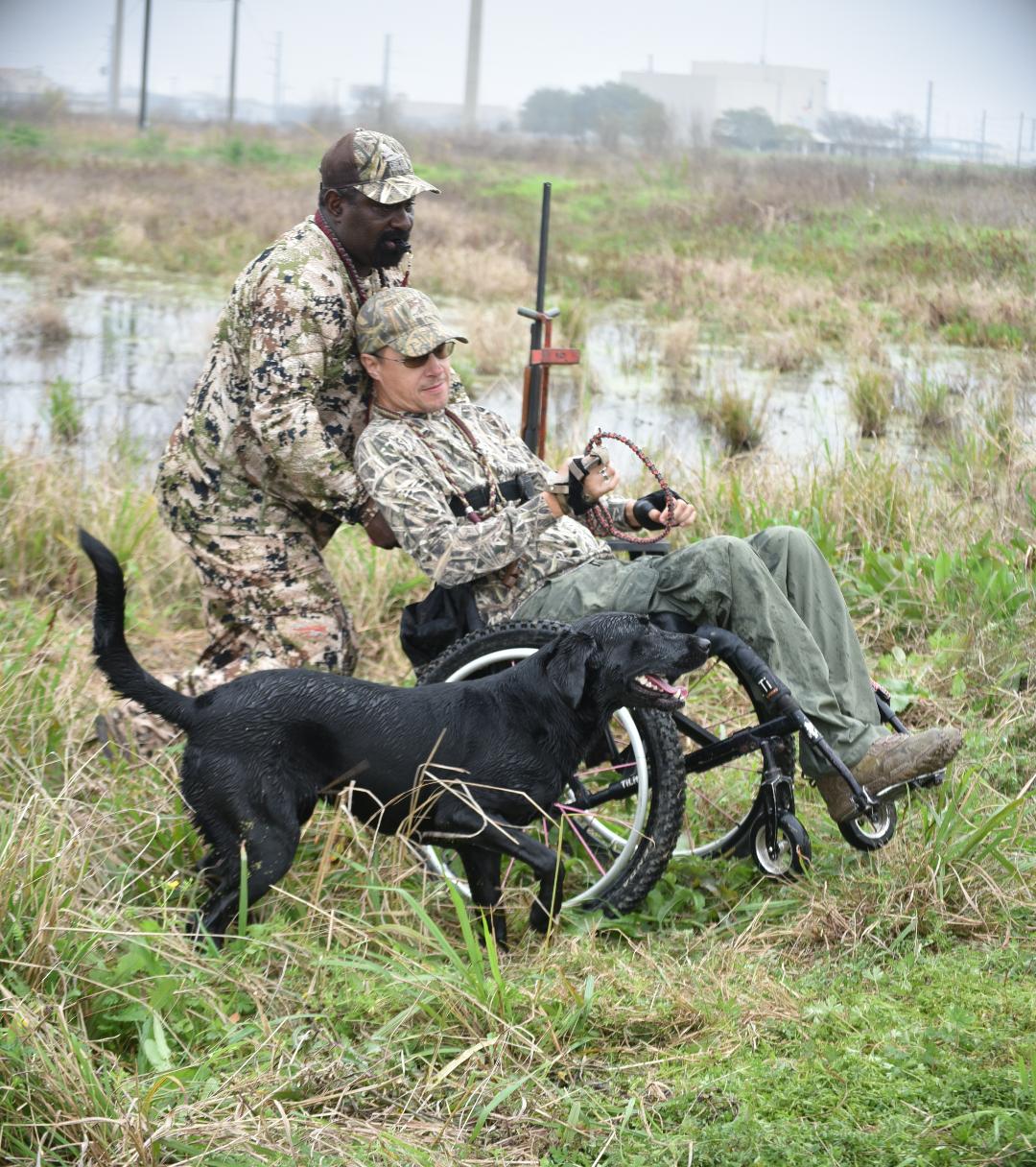
Vince worked with Vegas and Chad to give them both the necessary skills to compete in Hunt Tests.
The plan was for Vegas to go to Vince, a.k.a. boot camp, at six months old, and he’d keep her for six months of training. Until then, I’d get to teach her some simple commands like sit and heel, and do some basic retrieving to get her ready.
“Everything at that age is supposed to be fun,” Vince says, “Make everything a game and give her lots of praise.”
THE MOST DIFFICULT ONE TO TRAIN WAS CHAD
After three months at Camp Cannon, I began working with Vegas and Vince together so he could teach me how to handle my dog, mainly to keep me from screwing her up, I think.
That’s when I found out how little I actually knew about dog training too. Vince had Vegas doing things at nine months old that I’d never been able to get a dog to do.
ACTION VIDEO: WATCH VEGAS RUN DRILLS IN HER UKC HUNT TEST
Vegas came home with me, a fresh graduate from Vince’s boot camp, just in time for the hunting season. She was now what Vince called a “started” dog, meaning she could do everything I talked about above. We hunted together that fall and I took her everywhere I could with me.
She was so well-trained that I got the crazy idea to get her certified as a mobility/therapy dog. I volunteer at TIRR rehab hospital in Houston and I wanted to start bringing Vegas with me to see patients.
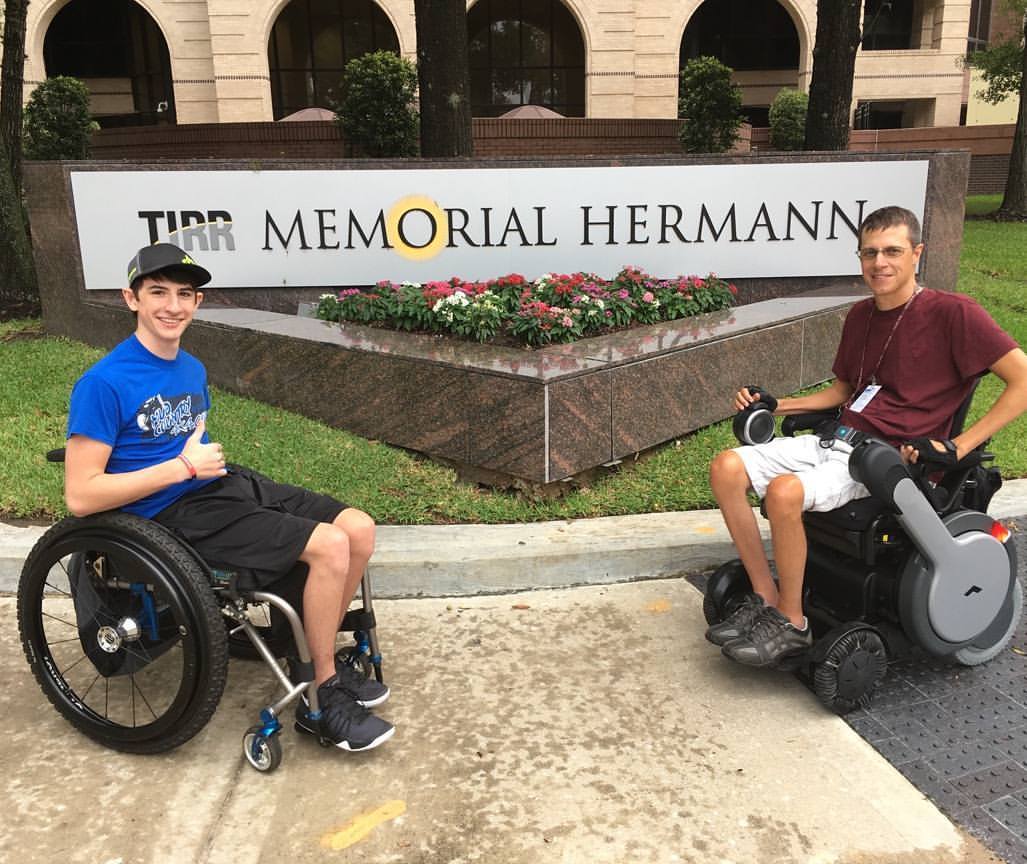 service dogs who hunt: VEGAS EARNS HER CERTIFICATION to begin HER THERAPY DOG CAREER
service dogs who hunt: VEGAS EARNS HER CERTIFICATION to begin HER THERAPY DOG CAREER
“On one of our first visits to TIRR, Vegas and I met a newly injured girl on a ventilator who was being wheeled by the room we were in when they stopped and brought her back in, on a bed mind you, because she so badly wanted to see my dog,” Chad explains.
I pushed a chair beside the bed and told Vegas to jump up and sit on it so she could get close enough to be petted. The injured girl couldn’t talk but kept mouthing the words ‘Thank you. Thank you.’ I knew then it was something we were meant to do in service together.
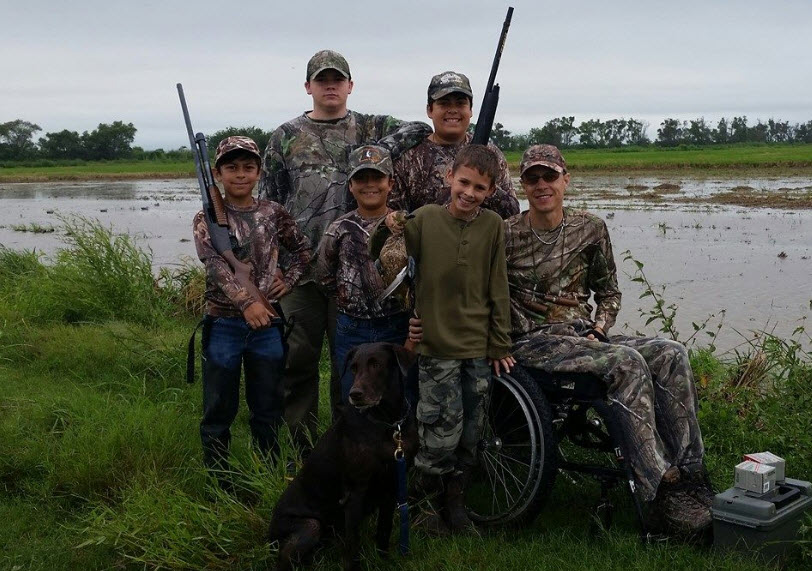
Vegas loves meeting new friends of all ages, no matter how they roll.
I’d heard of service dogs being cross-trained to be hunting dogs before, but never in reverse.
I do have one friend whose service dog, a yellow lab, was cross-trained to hunt with him, and the lady who led the initial training, Allie Keaton, told me it wasn’t all that uncommon a practice.
GOING THROUGH MY MITROFANOFF SURGERY AND GETTING ON THE HUNT TEST CIRCUIT
Since I was scheduled to have Mitrofanoff surgery in February of 2017, Vegas went back to Vince for two more months of training. I’d be laid up anyway and she needed to be prepped for her first hunt test… so win–win!
That March, Vince entered her in her first UKC event where she ran in the Seasoned division. She passed! Unfortunately, I was stuck in the hospital with an infection so I missed it, but I’ve been to every competition since then.
I still wasn’t thinking about doing the handling myself, though, until Vince told me he’d never seen anyone in a chair take over as handler during a competition in his 30 years of running dogs.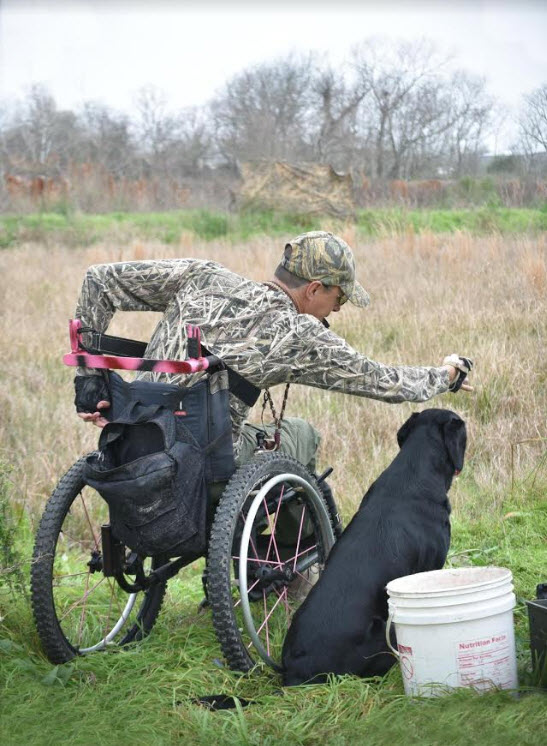
“Whenever I hear someone say they’ve never seen anyone in a chair do this, or that, I know I have to do it,” Chad explains.
Oh I’m sure there have been some guys in chairs that have run their dogs in hunt tests before. But a quadriplegic doing it? That’s a different story. I might be the first one.
THREE YEARS OF PRACTICE CULMINATES IN ONE HUNT TEST
Two years later, Vegas and I were ready to roll. We had two seasons working together and countless training sessions in between to get ready. I’d already attended four hunt tests to watch how the game was played while Vince and Vegas racked up Finished level passes and ribbons. With her next pass, she’d earn her HRCH title and I wanted to handle her when she did.
Since Vince was 51% certain that I wouldn’t screw it up, it was a go.
To give you an idea of what a finished pass entails, you have to “come to the line” with your dog off leash heeled at your side. Your dog must sit and watch three marked birds without breaking until you release them and then pick up all three (one-at-a-time) in any order.
Sometimes a diversion bird is thrown during a retrieve to see if a dog will chase it or switch birds (which disqualifies them). They also have to run at least one blind retrieve which is a planted bird the dog didn’t see go down.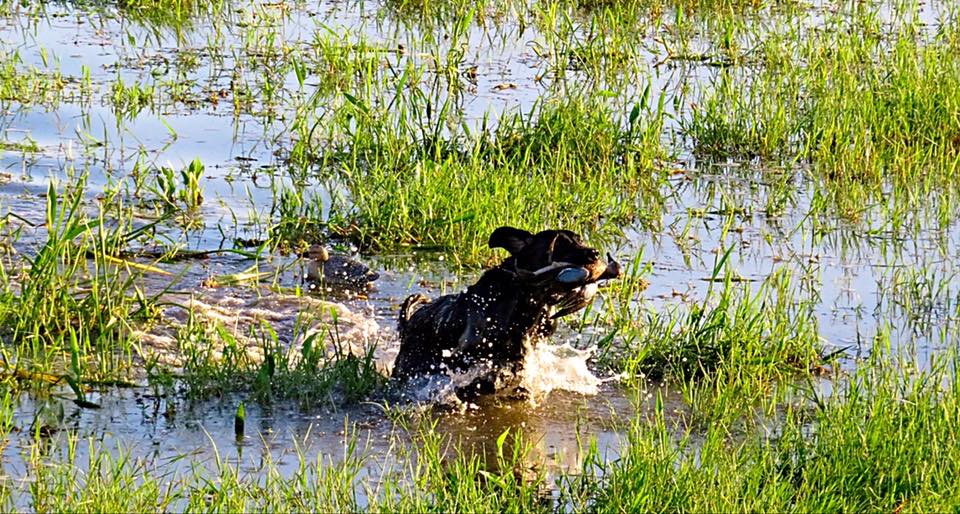 Handlers must get their dog to the blind by sending them toward it and using whistle and hand signals to lead them all the way to the bird. At the end of one of the tests, your dog must sit nearby and “honor” the next handler/dog team without breaking. There are two Finished tests per day, a land and a water, and you have to survive both to earn one pass.
Handlers must get their dog to the blind by sending them toward it and using whistle and hand signals to lead them all the way to the bird. At the end of one of the tests, your dog must sit nearby and “honor” the next handler/dog team without breaking. There are two Finished tests per day, a land and a water, and you have to survive both to earn one pass.
The difficult parts for me would be managing the rough terrain since the trails were held in fields that were usually muddy and bumpy and sometimes had tall grass to push through. I’d also need help loading and shooting the blanks while working my dog. That’s where Vince stepped in.
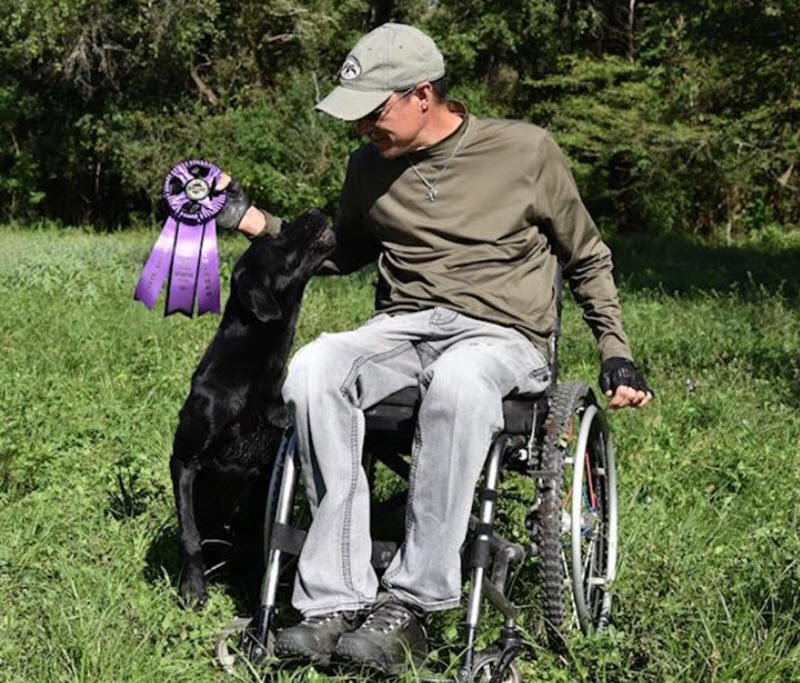
Vegas was born to win, and so was Chad Waligura!
In February 2019, Vegas and I rolled to the line for the first time in a UKC event in Dickinson, TX. That afternoon, she was a Hunting Retriever Champion!
CHAD CHOOSES A CURE CATHETER FOR DAILY CATHING
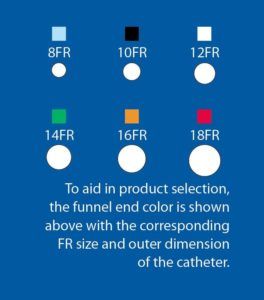 The day I cathed for the first time in my doctor’s office after having the Mitrofanoff procedure, they sent me home with about 10 different catheters to try.
The day I cathed for the first time in my doctor’s office after having the Mitrofanoff procedure, they sent me home with about 10 different catheters to try.
There were several brands to choose from, all sized 14 French, with varying means of lube and different shaped tips.
After a month of trials, I settled on the Cure Medical 16 French straight catheter. As a quad, I felt it was the easiest for me to use and the 16 French size drained faster than the smaller 14FRs.
The larger eyelets on the 16 French Cure Catheter help drain the mucous without having to irrigate every day or using a syringe to pull it out. I do order small bottles of sterile saline that help me irrigate about once a week, and I use a new bottle each time.
My Indiana pouch holds approximately 1200 ccs and today, I self-cath every 6-8 hours.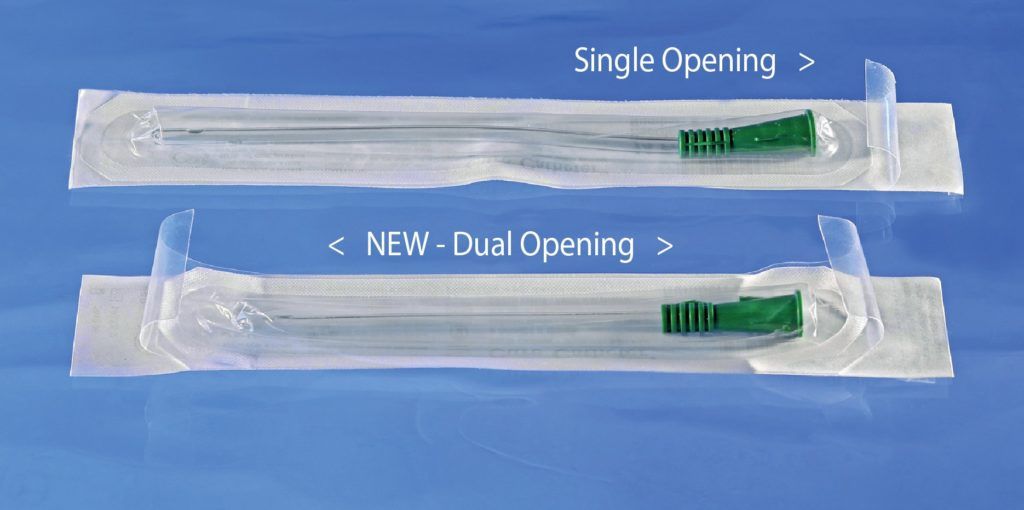
 To request free samples of the Cure Catheter® that Chad prefers or any Cure Medical catheter, contact your local distributor of quality healthcare products, or click here.
To request free samples of the Cure Catheter® that Chad prefers or any Cure Medical catheter, contact your local distributor of quality healthcare products, or click here.
Founded by a quadriplegic, Cure Medical is the only catheter manufacturer in the world that donates the first 10% of its net income to support research programs in pursuit of a cure for urinary retention, paralysis, spinal cord injury and central nervous system disorders.
Enjoy Our Free Resources & Articles
CURE NATION is designed with you in mind, to offer assistance and education when you need it through a personal support program.
All of the information you find below and on our related social media pages is meant to guide you to places, topics and resources that enhance your life, while also connecting you with a growing group of friends.
View our lifestyle resources by condition type:
Multiple Sclerosis, Pelvic Organ Prolapse, Prostate Cancer, Spina Bifida, Spinal Cord Injury and Transverse Myelitis
- Sign up for our free, CURE NATION e-newsletter to have our latest stories delivered directly to you, once a month.
- Get our FREE LIFESTYLE + ACCESSIBLE TRAVEL BOOKS here.
- Meet us in person at a CURE NATION event.
- Have an idea you’d like to share? Let us know.
- Be sure to take minute to meet our Cure Advocates too.
You may also enjoy:
The Cure Nation Rolls on Capitol Hill with United Spinal Members
Stevie Hopkins: Connecting the World Through 3E Love + the Wheelchair Heart
Arlene Long Shares Her Love of Community!
Meet the Downer Family: Open Hearts For Adopting Children with Special Needs
2019 Wheels UP! Accessible Travel Photo Contest Winners Announced
SCI Peer Counselor Jose Alzati Offers Dating & Relationship Advice
Hurricane Harvey Won't Stop PVA Games Champion "Wheelchair Willie" Hendrickson
Cure Founder Bob Yant: Fighting Paralysis with Persistence and Passion

